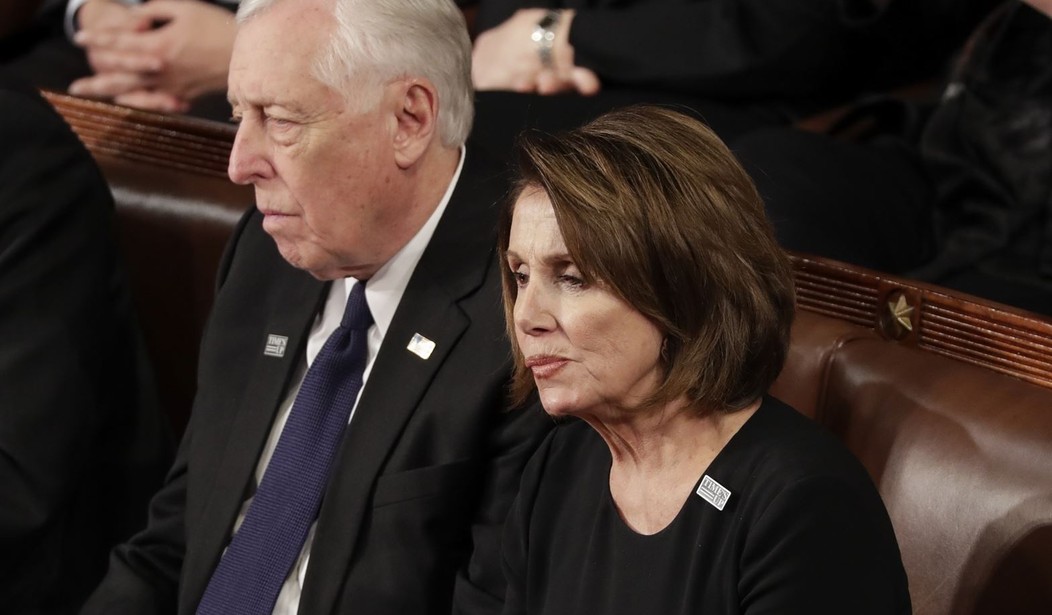There's an odd dichotomy playing out in our politics in which the conventional wisdom -- prodded by wild current events, history, developments like this and a pattern of off-year and special election results -- is sliding in one direction (a blue wave), whereas public polling has been moving in the opposite direction. Last week, we brought you Quinnipiac's latest national survey, which confirmed a downward trend for Democrats. Their 'generic ballot' lead over the GOP had tightened from ten points to six...to just three. That outcome wasn't too much of an outlier, we argued, and now a few brand new data points confirm the trajectory. A fresh Washington Post/ABC News national survey finds Republicans' deficit down to four points, virtually indistinguishable from the aforementioned Q-poll:
JUST IN: Democrats’ advantage in 2018 midterms narrows in latest @ABC News/WaPo poll, with Democrats holding a five-point lead among registered voters certain to vote in November. https://t.co/6GfHIGlp26 pic.twitter.com/t1sIoND6lm
— Evan McMurry (@evanmcmurry) April 16, 2018
Again, the month-over-month number is heading in the wrong direction for Democrats:
ABC/WaPo Generic Ballots:
— Logan Dobson (@LoganDobson) April 16, 2018
January : DEM +10
April: DEM +4 https://t.co/vIwx3xUOQ3
Here's a key finding from the poll, which may cause more angst among Democratic strategists than the underwhelming (and shrinking) top line number:
The Post-ABC poll finds parity in stated voting intentions. Among registered voters, 68 percent of both Republican-leaning and Democratic-leaning registered voters say they are certain they will vote. This contrasts with Post-ABC polling ahead of the 2010 and 2014 midterm cycles, when Republicans averaged a double-digit advantage in intentions to vote and Democrats suffered major losses in both years.
That would be the missing ingredient to a true Democratic wave election. Republicans had a large generic ballot lead in 2010, as a point of comparison, plus a double-digit lead on the important "intentions to vote" metric. Ed Morrissey also notes how the Left's tsunami-sized advantage on the ballot has been halved, on average, over the last few months: "The overall RCP average is 6.2 points, which is less than half of the 13-point lead in the aggregate averaging seen at the end of 2017." That said, WaPo's write-up includes this nugget, which could be much more important than a broader nationwide number: "The situation in the districts where control of the House is likely to be decided is slightly more favorable for Democrats. The Cook Political Report, which produces nonpartisan analysis, lists 56 of the 435 congressional districts as competitive — 51 of them in Republican hands to just five held by Democrats. In competitive districts excluding Pennsylvania, where new boundaries were drawn this year, Democrats have an edge of 50 percent to 43 percent when voters are asked which party’s candidates they would favor if the election in their district were held today."
A seven-point Democratic lead in battleground districts simply cannot be construed as good news for Republicans, who'd lose the House if just 23 of those contested districts flip. And remember, on paper, PA-18 wasn't supposed to be a strong pick-up opportunity for the Democrats...until it was. Meanwhile, NBC/Wall Street Journal's new poll (in a series that has been quite unfriendly to Republicans over recent cycles) also shows similar movement, albeit bit less pronounced. That said, unlike in the survey we just looked at, Democrats maintain a clear intensity edge in this one:
Recommended
The poll showed voters favor Democrats by a 47-40 edge on the generic ballot, which is down from a 50-40 lead Democrats had in March. Democrats need to flip 23 seats this fall to secure a majority. However, 66 percent of Democratic voters have a high level of interest in voting this fall, while 49 percent of Republicans do. A high level of interest is marked by a score of 9 or 10 on 10-point scale. The percentages are reminiscent of the last time a president was facing intense opposition during his first term. Data from NBC/WSJ polling in 2010, when Republicans seized the majority in the House during President Barack Obama’s first term, showed that 66 percent of GOP voters had a high level of interest, while 49 percent of Democrats said as much.
If NBC/WSJ's numbers are correct, Democrats are on track to at least approach the GOP's dominant performance in 2010; if the WaPo/ABC results are more accurate, on the other hand, the Democrats would fail to fully capitalize on what should be a very auspicious political climate. For the moment, I'd make the following points: Democrats are certainly in a stronger position than Republicans right now, and the only question in my mind is how much stronger. This analysis of the generic ballot's usefulness is worth a read, as is this commentary on late-braking undecideds, a group that fuels waves. Republicans' situation may not be as dire as many in the media are predicting or hoping, but I still find actual electoral results to be more compelling guideposts than any public opinion surveys.
One last caveat and question: When Obama's party got wiped out eight years ago, the president's signature policies were unpopular and the economy was struggling. By contrast, tax reform has gotten a big boost, and the economy is booming. Can the GOP parlay those substantive differences into their 2018 salvation? Or at least seriously mitigate the damage? Oh, and always, there's a long, long way to go until November.

























Join the conversation as a VIP Member